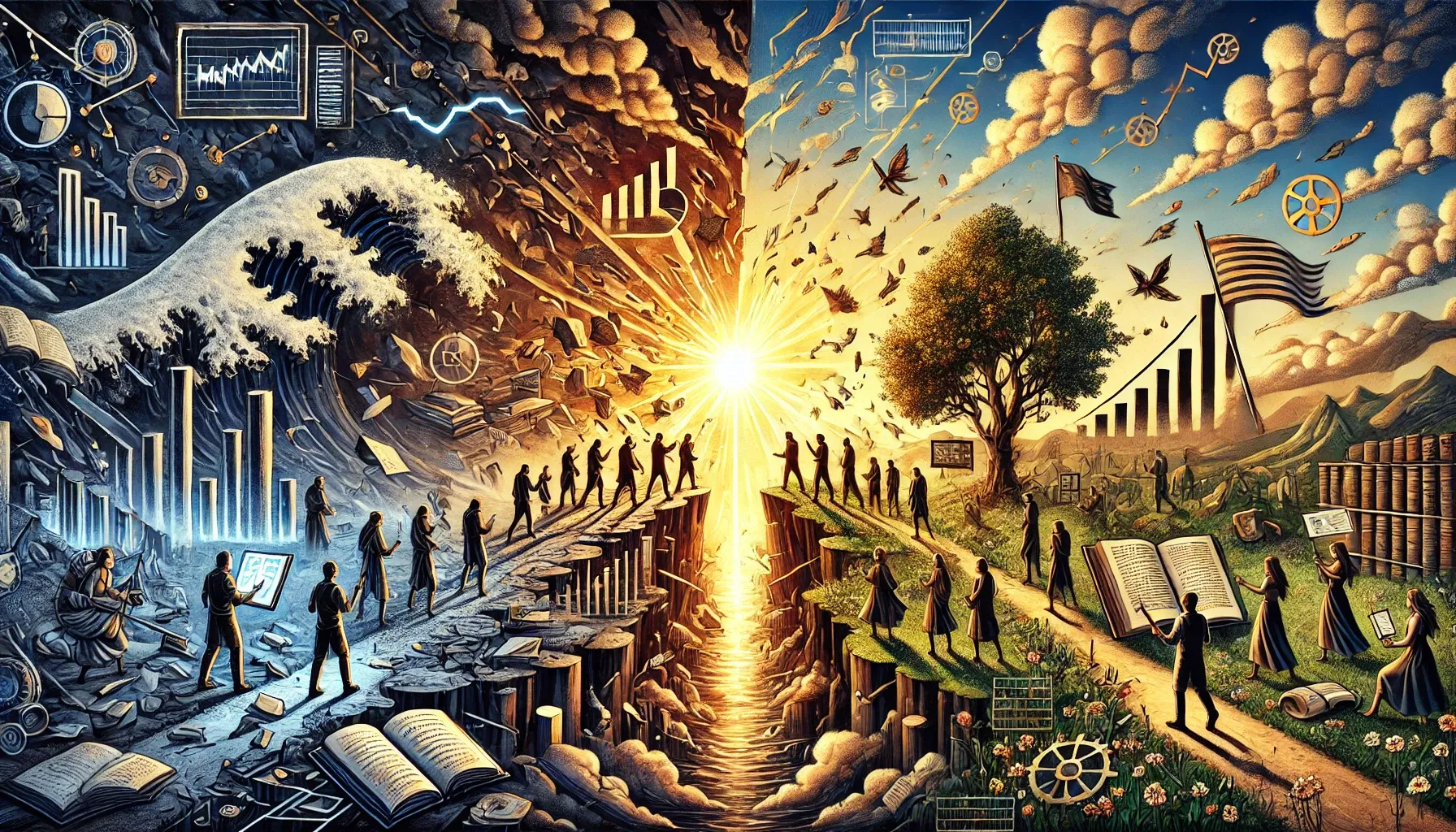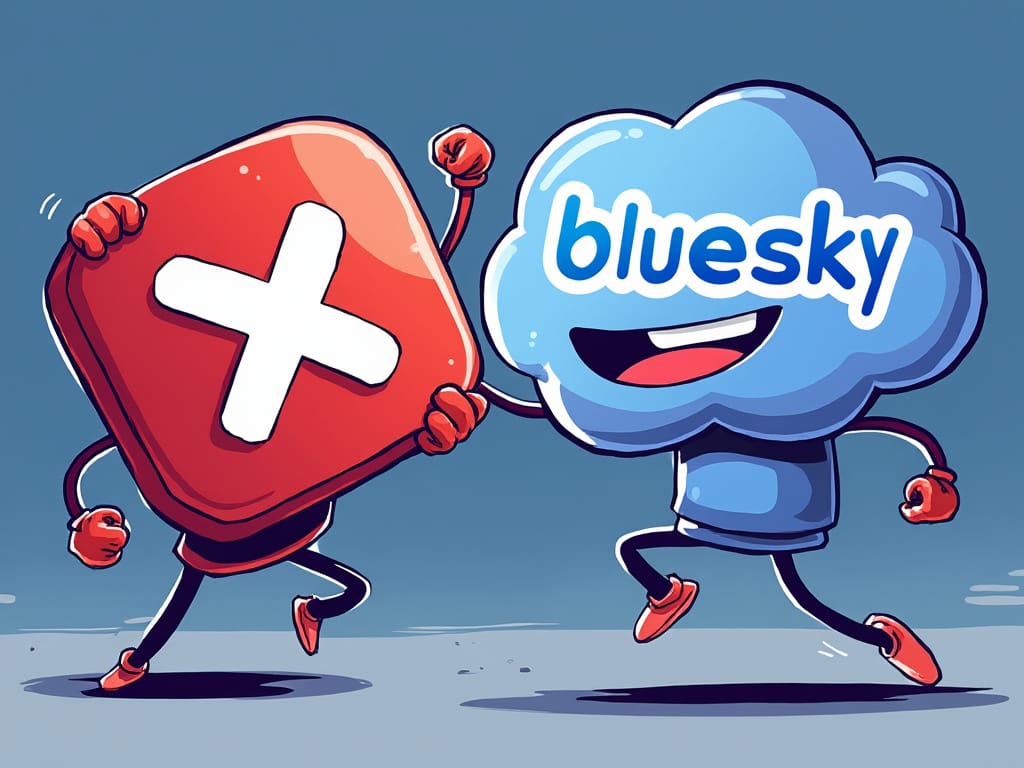Snowflakes: Telling Better Stories

We're losing the battle of ideas. Oh, and facts. I tell you, those things are strewn across the battlefield. Some are still twitching, but it doesn't look good for facts. Somebody should really call a medic.
I suppose I should start by pointing out that I am a Canadian, living in Canada, so that's going to colour my viewpoint (and the way I spell "color"). That said, when I think about the political and social divides we’re seeing these days, especially in places like the United States, I can’t help but feel that we’ve lost something. Maybe even something vital. Vital in the sense that it keeps us alive.
The election south of where I live returned Donald Trump to power, despite every prediction that suggested it was a done deal for the Democrats. This was followed by an outpouring of righteous horror which was then followed by something even worse. People breaking off relationships, deleting friends, severing family ties—all because they dared to vote “wrong.”
On one hand, things totally rock. Not everything is awesome, but there's a lot to get excited about. We’re living in a time of unparalleled discovery, a time where technology and science are taking us to places our ancestors couldn’t even imagine. And yet, instead of celebration, there’s this overwhelming sense of darkness and doom. It's like the Apocalypse, but you can still buy coffee and donuts, like in the LEGO Movie 2. Good morning, sewer babies!
So what’s going on here? Why are we so intent on beating each other over the head instead of learning from each other? You know? Having a nice chat. Or not so nice chat, but a chat nonetheless. I think part of the answer lies in the fact that we’ve stopped telling good stories. That might sound absurd, but bear with me here. For as long as we humans have existed, we’ve been storytellers. It’s in our DNA. Myths, legends, fables, and tall tales, are how we’ve understood the world and our place in it, our hopes and our fears. It's also how we came up with some really crazy ideas, but I digress...
Somewhere along the line, we seem to have forgotten that storytelling isn’t just about “us versus them.” Not everything has to be a fight. A good story doesn’t need to be a takedown of the other side where everybody dies. Well, okay, sometimes it ends that way, but there's usually somebody left to tell us why it was a bad idea all along. Think "Romeo and Juliet" or "Hamlet". Sure, it ends badly for the title characters, but we all learn a good lesson and move on.
Ah, I miss old Willy Shakespeare.
Right, good stories. Good stories should inspire and draw people in. And right now, if I’m being honest, the political right seems to be doing that better than the left.
Now, before anyone jumps in to correct me, I’m not talking about the truth of these stories. After all, the orange one lies like the proverbial rug. I’m talking about how effectively those stories are told. Whether it’s a narrative about patriotism, security, or even some absurd story like “they’re eating dogs and cats in Springfield,” it resonates. It resonates because it’s simple, it’s direct, and it taps into something primal. People hear it, and it sticks with them. Now, compare that to the left’s approach. We either get angry, trying to debunk everything point by point, or we walk away, retreating to a “safe space” where we don’t have to engage at all. And as a result, we leave the field wide open for those stories to take root, unchallenged.
Let’s be honest. If we’re only battling misinformation with fact-checks and statistics, we’re playing a losing game. People don’t form their beliefs based on cold data; they form them based on emotion. On resonance. Shit like that. Facts are important. Don’t get me wrong. But they’re not enough by themselves. Not enough to win elections, or turn the tide in our favour. We need to counter with stories of our own, stories that celebrate what’s going right in the world, stories that remind people of what humanity can accomplish. Because, you know, we can do some pretty amazing things. And we need to do it consistently, not just as a reactive, last-ditch effort when the other side is dominating the conversation.
I subscribe to a news service called Ground News, based out of my own backyard in Waterloo, Ontario. One of the things they do that I find refreshing is this concept of the “blind spot.” They show stories that are ignored by one side or the other—stories that the left isn’t seeing, or stories the right isn’t seeing. It’s a small thing, but it’s crucial. Because when you can see both sides, when you understand what’s being said in that “blind spot,” you get a fuller picture of reality. It’s the same with storytelling. If all we do is ignore or walk away from the narratives we don’t like, we’re missing out on the chance to bridge gaps, to challenge, and yes, to change minds. And no, I don't work for Ground News and they aren't advertising with me here.
One of the words that the right likes to use to describe the left is "snowflake". As in, when the heat gets turned up just a little, we melt. Here’s the irony. In trying to avoid the “snowflake” label, many on the left are proving it right. Instead of staying in the conversation and showing resilience, too many retreat into echo chambers where everything feels “safe” and comfortable. We avoid confrontation, avoid discomfort, and in doing so, we reinforce the other side’s view of us. But what if we leaned into that discomfort instead? What if we embraced a kind of storytelling that doesn’t melt under pressure but instead withstands it, answers it, and offers something better?
It doesn’t have to be a fight. In fact, it shouldn’t be. A good story doesn’t alienate; it connects. It can inspire hope, spark curiosity, and—most importantly—invite people to see the world a little differently. Instead of just saying, “You’re wrong,” we could say, “Here’s what’s possible.” And it’s not as if we’re lacking in material. Think about the remarkable progress humanity has made in the last few centuries. Think about the breakthroughs in medicine, the discoveries in physics, the expanding horizons of space exploration. For all our challenges, we live in a world that, in many ways, is better than it’s ever been. We should be celebrating that, sharing that, building on that story every chance we get.
People need something to believe in. If we keep telling only stories of doom and gloom, people will start to believe that’s all there is. But if we tell stories of resilience, of creativity, of human achievement, maybe—just maybe—we’ll give them a reason to look up. Maybe we’ll inspire the kind of hope that makes people want to build a better world instead of just hiding from a broken one.
I think it’s time for the left, for all of us who want to see progress, to start telling those stories. Not as a counter to some other narrative, not as a way to “win” against the other side, but as a genuine celebration of what’s possible. Let’s leave the doom and despair to those who want to divide. And let’s build a new story that invites everyone to imagine a better future.
I need to wrap this up, but let me wander over into one of the very places the left is fleeing.
Even as I write this, we're watching this very phenomenon play out in real-time. Take the mass exodus from X (formerly Twitter) to platforms like Bluesky, Threads, or Mastodon. Okay, it's mostly Bluesky. Still, there's a certain irony in watching a platform supposedly dedicated to "free speech" (looking at you, Elon) become a place where certain voices feel they must leave to be heard. It's like watching a star collapse in on itself, creating a gravity well that pulls everything into an increasingly dense core of homogeneous thought. And it's cold in there. Really cold.

But here's the thing about digital diasporas (oh, yeah, totally forgot about Diaspora) they often reinforce the very divisions we need to bridge. When we retreat to our new, safe platforms, our carefully curated spaces where everyone there thinks like us, and votes like us, we're not just changing our social media preferences. We're actively participating in the bifurcation of our shared reality. We're basically creating parallel universes of thought, each with its own truth, its own facts, its own version of reality. Earth-left and Earth-right as opposed to Earth One.
And yes, maybe it's too late to reverse this particular digital divide. The eXodus to blue skies (see what I did there) is already well under way, the lines have been drawn, and the spaces have been claimed. But that doesn't mean I'm wrong about our need for better storytelling, for building bridges rather than walls, even great walls (okay, I'll stop). If anything, it makes the whole eXperiment more urgent. (Okay, okay!)
Because here's what we know... Trump's electoral success wasn't just about manipulation or misinformation, and let's be clear, there was a lot of both. It was about resonance. His messages found purchase in minds that progressive narratives failed to reach. And if we're serious about advancing progressive ideas, we need to acknowledge an uncomfortable truth. We're going to need allies on the right. Not because we agree with everything they believe, but because change, real, lasting change, requires a broad coalition of minds working together.
The future isn't about safe spaces or echo chambers, or if it is, we're in even more trouble than we are right now. It's about creating brave spaces, not safe spaces, where different ideas can coexist, collide, and sometimes combine into something new. It's about recognizing that even those we disagree with might have ideas on what it is we need to build a better world.
So yes, let the social media landscape fragment. Companies come and go and my ICQ client has been really quiet for a few years now. So, let platforms rise and fall. But let's not mistake platform loyalty for progress. The real work happens in the spaces between, in the conversations we have with those who think differently, in the stories we tell that bridge divides rather than deepen them, and in those moments when we choose engagement over retreat.
Because in the end, the battle of ideas isn't really about winning or losing, whatever we think we learn from this polarized landscape. It's about evolution, and evolution is slow. And sometimes, it's also a painful process of growth and change that happens only when different perspectives collide and combine.
And that's a story worth telling, again and again, until we get it right.
Now, feel free to tell me I'm wrong. Leave a comment. Share with others, but join the conversation, whether you're on the left, or the right, or here in the middle where I mostly hang out.
